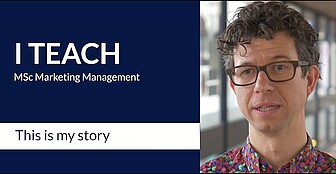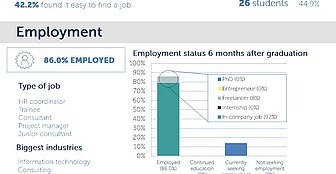
This website uses functional cookies, including analytical cookies. The obtained statistical data cannot be traced back to individual users. Additionally, you can choose to accept or refuse consent to use marketing cookies. If you decline these additional cookies or refrain from making a choice, only functional cookies will be set. See our cookie policy for more information.
Blog: Monday, 26 January 2015
More than one million businesses worldwide are ISO 9001 certified. ISO 9001 helps businesses to better serve their customers and simultaneously comply with product-related regulatory requirements. But does the standard live up to its expectations? Is it really worth investing time and money in an ISO 9001-based quality management system and its certification? New research by PhD candidate Başak Manders of Rotterdam School of Management, Erasmus University (RSM) reveals there is no one-size-fits-all implementation of the system for all companies – and in some sectors and countries companies will experience fewer increases of marketing and operational benefits than they were hoping for.
In her dissertation Implementation and Impact of ISO 9001, RSM’s PhD candidate Başak Manders examines the effectiveness of ISO 9001 adoption from its creation in 1987. Literature provides mixed results regarding the operational and market benefits of ISO 9001 adoption. Manders confirms that national differences, such as culture and level of economic development, have an impact on the effectiveness of ISO 9001 adoption, and reveals further predictive variables at both the organisational and employee level.
According to Manders’ research, developing countries are likely to gain higher operational performance improvements from ISO 9001. Implementing ISO 9001 helps firms in developing countries develop more sophisticated approaches to quality management. This in turn has an impact on operational performance. Also, societies that have higher institutional collectivism and performance orientation cultures, and those with lower power distance and future orientation cultures, gain more performance benefits.
So should there be one standard worldwide? The International Organization for Standardization might consider whether to adapt aspects of the standard to different cultures. However, each country has its own need and having different versions of the standard per country would mean that ISO 9001 is not a unique, international standard anymore. So a more feasible alternative is for consultants to help companies to create the best possible cultural environment for ISO 9001 implementation. In other words, ISO 9001 consultants should be aware of the national cultures manifesting in a company and help to implement ISO 9001 based on cultural conditions.
Manders also shows that initially the impact of the ISO 9001 system might not be positive, but most companies manage to reap benefits over the medium to long term. These benefits arise from the signal the certificate provides in the market and from operational benefits generated by the quality management system itself. Manders’ research also shows that some national, organisational and behavioural factors affect the benefits gained from ISO 9001.
The research also reveals that manufacturing companies benefit more than service companies, and large companies benefit more than small and medium-sized companies. The benefits from the system itself might depend on the motivation to implement. Manders’ research discusses that companies with an intrinsic motivation strive to develop an effective quality system instead of just getting a certificate, and are therefore more likely to correctly implement the standard and gain more benefits. The system’s benefits depend on managerial commitment and support. Managers should follow practices related to their ISO-9001-based quality management system, teach employees to trust the system, and provide the necessary resources to support employees in using the quality management system.
Manders’ research also discusses that companies might have systems that really meet the standard’s requirements, more rigid systems, superficial systems, or a combination of these extremes. Auditors must be aware of this situation and identify companies that do not have an established quality management system. She also discusses that even if companies want to have a good working system, some employees may not jump on the bandwagon. Consultants should pay attention to employee involvement when helping companies to implement ISO 9001. Certification bodies should also pay attention to employee involvement and make sure that the employees are using the quality management system. Auditors should not only audit employees chosen by the company to be audited, but should also audit people who might not be involved in ISO 9001 directly.
Başak Manders will defend her dissertation in the Senate Hall at Erasmus University Rotterdam on Friday, 30 January 2015 at 9:30. Her supervisor is Professor Dr Knut Blind and her co-supervisor is Dr Ir Henk de Vries. Other members of the Doctoral Committee are Dr Daan Stam (Erasmus Research Institute of Management), Professor Dr Kevin Linderman (Carlson School of Management), and Professor Dr Mohan Tatikonda (Kelley School of Business).
Vanderlande

Fraunhofer ISI

Prof. Knut Blind was a senior researcher and head of department at Fraunhofer ISI between 1996 and 2010, before returning to Fraunhofer ISI in October 2019 as the coordinator of the Business Unit Regulation and Innovation. Between 2010 and 2019, he worked in the Innovation Management Department of the Fraunhofer Institute for Open Communication Systems as a project manager. Since 2006, he has also been Professor for Innovation Economics at the Technical University Berlin. Between 2008 and 2016, he also held the Endowed Chair in Standardization at Rotterdam School of Management, Erasmus University Rotterdam.
Başak Manders has defended her dissertation in the Senate Hall at Erasmus University Rotterdam on Friday, 30 January 2015 at 9:30. Her supervisor is Professor Dr Knut Blind and her co-supervisor is Dr Ir Henk de Vries. Other members of the Doctoral Committee are Dr Daan Stam (Erasmus Research Institute of Management), Professor Dr Kevin Linderman (Carlson School of Management), and Professor Dr Mohan Tatikonda (Kelley School of Business).

The ISO 9001 quality management system has been implemented by more than one million organisations in 187 countries since its introduction in 1987. A newer version of ISO 9001 is planned to be introduced in 2015. Even though it is widely used by organisations to gain both operational and market benefits, the studies on the impact of ISO 9001 report mixed findings. The aim of this dissertation is to find out what the impact is of ISO 9001, and to better understand the differences in current literature.
The findings demonstrate that ISO 9001 leads to operational and market benefits in the majority of cases. Manders also shows that the benefits gained from ISO 9001 differ depending on the length of the period since certification, standard version, geographic location, industry sector, and company size. She also demonstrates that national differences, specifically the level of economic development and national culture, have an impact on the performance benefits of ISO 9001. Manders finds that not all employees within a company use ISO 9001 in their daily work. Employees who have a positive attitude towards using ISO 9001, are aware of how to use it, believe it is useful and find it easy to use are more inclined to really use it. Employees who feel responsible for the ISO 9001 quality management system are more inclined to contribute to the improvement of the system.
Together, these three chapters illustrate that the relationship between ISO 9001 and business performance is not as straightforward as is often assumed. Manders’ findings indicate that the implementation and the impact of ISO 9001 can be studied and explained at three different levels: country level, company level and employee level.



















Science Communication and Media Officer
Rotterdam School of Management, Erasmus University (RSM) is one of Europe’s top-ranked business schools. RSM provides ground-breaking research and education furthering excellence in all aspects of management and is based in the international port city of Rotterdam – a vital nexus of business, logistics and trade. RSM’s primary focus is on developing business leaders with international careers who can become a force for positive change by carrying their innovative mindset into a sustainable future. Our first-class range of bachelor, master, MBA, PhD and executive programmes encourage them to become to become critical, creative, caring and collaborative thinkers and doers.
